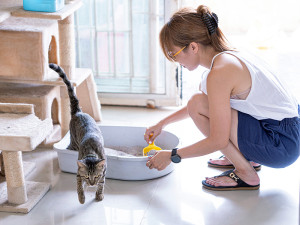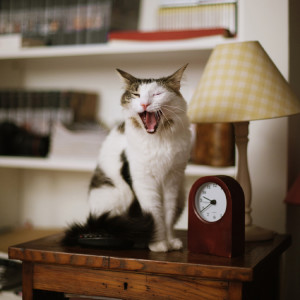Can Cats Get Kennel Cough From Dogs?
The answer isn’t fun, but you can prevent this.

Share Article
In This Article:
While kennel cough is more common in dogs, cats can also contract a version of this highly contagious illness. Although rare, cats can catch kennel cough from infected dogs, particularly in multi-pet households or boarding facilities, making it important for cat parents to recognize the symptoms.
While cats aren’t the usual species that kennel cough is found in, they can get infected with one of the bacteria associated with kennel cough in dogs. The disease in cats isn’t normally referred to as “kennel cough,” though it does share some features with classic canine kennel cough.
Kennel cough causes
In dogs, kennel cough is officially known as canine infectious respiratory disease. That’s quite a mouthful, so most people who aren’t writing medical records just call it “kennel cough.” Kennel cough can be triggered by many different viruses or bacteria, including:
Canine parainfluenza virus
Coronavirus (not the human one!)
Canine herpesvirus
Canine adenovirus-2
Bordetella bronchiseptica
The agent causing kennel cough that is shared between dogs and cats is Bordetella bronchiseptica. These bacteria colonize the respiratory tract and are passed between animals by either an airborne route (due to coughing or sneezing) or fomite route (picked up from contaminated objects). Fortunately, cats tend to be more resistant to infection and illness from Bordetella. This doesn’t mean they can’t have problems, though.

Kennel cough symptoms in cats
Symptoms of a Bordetella infection in cats are usually mild and self-limiting, commonly resolving within 10 days. Some cats can carry the bacteria without showing any signs of infection. The most common symptoms of the cat version of kennel cough include:
Fever
Sneezing
Appetite loss
Coughing
Difficulty breathing
Lethargy
Kennel cough usually causes a dry, hacking cough, but coughing in cats tends to be less frequent and severe than in dogs. This is likely why the disease isn’t called “kennel cough” in cats. It’s usually just referred to as an upper respiratory infection (URI), a term that catches all of the possible viral and bacterial causes of these symptoms in cats. URI symptoms in cats (like those above) can make it sound like your cat is coughing and wheezing due to inflammation in their airways.
Can cats get kennel cough from dogs?
Depending on the cause of a dog’s kennel cough, it is possible they could get a cat sick. The viruses that cause kennel cough won’t spread to a cat because they are species specific. Bacteria like Bordetella can be spread between species though, and cats can get infected with Bordetella from dogs with kennel cough.
Spread of infection from dogs to cats is uncommon, and it’s rare for a cat to show signs of illness if a dog in the house comes down with kennel cough. Dog-to-cat or cat-to-cat spread is more common in situations with a large number of animals kept in a small area, like shelters or boarding facilities.
Kennel cough risk factors for cats
Cats with a compromised immune system are more likely to get sick from a dog with kennel cough. Two of the major diseases that cause immune compromise in cats are feline leukemia (FeLV) and feline immunodeficiency virus (FIV). Catteries with FeLV or FIV-positive cats can see more sickness from dogs with kennel cough or other cats that are carrying Bordetella.
Age itself isn’t a disease, but older cats are more likely to have problems like diabetes that affect their immune system. If they have pre-existing health problems, older cats can get sick from dogs with kennel cough more easily. Young kittens may also be at an increased risk of severe illness from Bordetella infections. They’re more likely to get pneumonia, which can make them quite sick and require medications and in-hospital care to help them recover.
When to seek veterinary care
If your cat is showing any signs of an upper respiratory infection, talk to your vet to inform them of the illness. For cats with mild symptoms, they may just recommend TLC at home until the symptoms go away on their own.
For cats with more severe infections, antibiotics, oxygen therapy, appetite stimulants, or other treatments may be needed to get them feeling better. Signs that you should take your cat to the veterinarian include:
Rapid or labored breathing
Pale or bluish gums or tongue
Lack of appetite
Weakness
Failure of symptoms to resolve within 10 days
Bloody discharge from the eyes or nose
Inability to open the eyes
It’s always better to be safe than sorry, so take your sick kitty to the vet if you’re worried about them for any reason. Just let your vet’s office know that your cat may have a contagious disease so they can take precautions to protect other pets.
Preventing kennel cough in cats
The idea behind keeping kennel cough from spreading to your cat is pretty simple. Keep your cat indoors and don’t expose them to new animals, especially if those animals are sick. This works well for most situations, but sometimes contact is unavoidable. These are some additional strategies you can use to keep kennel cough away from your cat:
Isolating new or infected pets
Despite your cat’s wishes, you may want to introduce a new pet into the household. Even if the new dog or cat is up to date on vaccinationsopens in new tab and doesn’t appear sick, it’s a good idea to keep them isolated for a bit. Some pets can carry Bordetella or other causes of kennel cough without showing any symptoms, so they could get your cat sick despite appearing healthy. Keep your cat and any new pets separate for at least a week to prevent the spread of illness. This time can also help your cat gradually get used to the idea of a new housemate being around.
Vaccinations
A vaccine for Bordetella bronchiseptica exists, but it is not part of the core vaccines recommended for cats or kittens. Infection and significant illness from Bordetella are uncommon enough that it’s not generally necessary to vaccinate cats against it. Vaccination may be recommended for some cats in high-risk situations like animal shelters or breeding catteries. Routine vaccination of immunocompromised cats (like those with FeLV or FIV) is not recommended.
Vaccination of cats against Bordetella is also not recommended if their caretakers are immunocompromised themselves. The kennel cough vaccine is a modified-live intranasal vaccine. This means that a weakened, but still living strain of the bacteria is given in the nose. The weakened bacteria are easy for a healthy immune system to kill and develop antibodies against, but compromised immune systems can have trouble fighting off even this weakened version of the bacteria.
There have been reports of immunocompromised people getting infected with Bordetella after their pets were vaccinated. For this reason, cats and dogs sick with kennel cough-like diseases should be kept isolated from pet parents with weakened immune systems.
Maintaining a clean, well-ventilated environment
If you have a shelter or a household with a lot of pets in it, keeping things clean is vital to preventing the spread of diseases like kennel cough. Fresh-air ventilation and HEPA air filters can help to reduce the load of bacteria and viruses in the environment. All surfaces should be cleaned regularly, and sick pets should be isolated. Cats can get kennel cough from your clothes, so be sure to change clothes after being around sick dogs or cats.
Proper nutrition and stress reduction
Stress and poor nutrition both negatively affect the immune system and make it hard for cats to fight off infections like kennel cough. Keep your cat on a complete diet appropriate for their life stage and make sure that their home life is as calm and peaceful as possible. Providing environmental enrichment and regular play timeopens in new tab can go a long way in keeping your cat happy, healthy, and stress-free.
FAQs (People also ask):
Why is my cat coughing?
Cats can cough due to upper respiratory infections, feline asthmaopens in new tab, airway irritation, or lung disease. Your veterinarian can examine your cat and take chest radiographs to help determine the cause of your cat’s cough.
Can cats get kennel cough?
One of the bacteria that causes kennel cough in dogsopens in new tab is contagious to cats. It’s uncommon for cats to get kennel cough symptoms after coming in contact with a dog with kennel cough, but it is possible.
Why does it sound like my cat is coughing?
Cats can cough just like people and figuring out the cause can be a challenge. Cats may cough due to airway infectionsopens in new tab, asthma, lung disease, cancer, allergies, or a number of other issues. See your vet if your cat is coughing.
References:

Dr. Bartley Harrison, DVM
Dr. Bartley Harrison is a veterinarian with more than 19 years of experience. He has treated a variety of species in emergency and speciality practices for both large and small animals. His primary interests as a vet are emergency medicine and critical care.
Related articles
Why Does My Cat Have Diarrhea?
Let’s try to, erm, firm up the details.
![grey and white cat with tongue sticking out]()
Why Does My Cat Keep Throwing Up?
Here’s when you should worry.
![Uncomfortable looking gray cat sitting on a window sill]()
Should Your Cat Go to the ER?
Here are six good reasons to haul tail to the emergency room.
![White-and-brown cat sitting on a side table by a lamp with their mouth open, gagging]()
Your Cat Is Gagging. Should You Panic?
It’s not always an emergency — but it could be.







